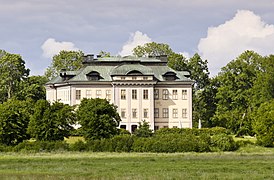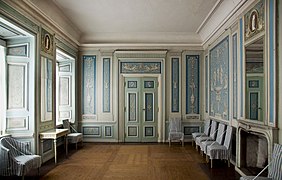Salsta Castle (Swedish: Salsta slott) is a country house in Sweden, situated north of Vattholma, Uppsala Municipality, approximately 25 kilometers north of Uppsala.[1][2] A fortified castle was already present on the site in the late 13th century, and the estate has belonged to some of the most influential noble families in Sweden, including Oxenstierna, Bielke and Brahe. The present palace was erected in the French Baroque style in the 1670s for Nils Bielke the Younger, 1st Count Bielke af Åkerö and Imperial Count of Torgelow, incorporating elements from an earlier Renaissance castle, and designed and constructed by Mathias Spieler after an earlier design by Nicodemus Tessin the Elder.[3][4][5][6]
-
View from the park
-
The blue empire room
| Salsta Castle | |
|---|---|
| Salsta, Uppsala Municipality, Uppsala County, Sweden | |
 | |
| Coordinates | 60°02′43″N 17°44′23″E / 60.04528°N 17.73972°E |
| Type | Country house |
| Site information | |
| Owner | Swedish state |
| Open to the public | Guided summer tours by appointment |
| Site history | |
| Built by | Mathias Spieler |
Architecture
editSalsta is built of stone and brick on two floors in an open square, except for the basement floor. The building has a lower ground floor with two projecting corner pavilions and two independent wings facing the garden side . The building has around 35 rooms. The high plinth contains beautifully arched rooms for the kitchen and other economy spaces . There is also a hall in direct contact with the garden.[7]
The ground floor was decorated in 1682, but was furnished four years later. There is a series of fabric-stretched ceilings with paintings in shades of gray, imitating stucco . In the count's bedchamber, the alcove is decorated with gilded columns.
See also
editReferences
edit- ^ Mats Åmark (1967). A Guide to Uppsala Cathedral. Almqvist & Wiksells. p. 6.
- ^ "Salsta Castle". Destination Uppsala. Retrieved 24 April 2023.
- ^ "Salsta Castle, Vattholma, Sweden - SpottingHistory.com". www.spottinghistory.com. Retrieved 24 April 2023.
- ^ "Salsta". Nordisk familjebok (in Swedish). Project Runeberg. 1916. p. 511.
- ^ "Salsta slott, Uppsala" (in Swedish). Statens fastighetsverk. Archived from the original on 14 July 2014. Retrieved 25 April 2023.
- ^ Bedoire, Fredric (2006). Svenska slott och herrgårdar, En historisk reseguide [Swedish Castles and Manors, a Historic Travel Guide] (in Swedish). Stockholm: Albert Bonniers Förlag. pp. 306–307. ISBN 91-0-010577-5.
- ^ "Kringla - SALSTA SLOTT". Kringla (in Swedish). Retrieved 2023-07-27.

